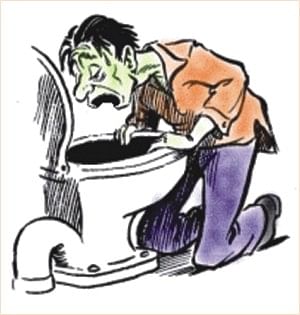<i>ABC of food poisoning</i>

Food-borne illnesses affect millions of people each year. Foodstuff can cause illness if they contain toxin or poison produced by bacteria growing in food.
After a person has eaten those foods, the microorganisms continue to grow, causing an infection. The onset of symptoms is usually very sudden, often within hours of eating the contaminated food.
Although each individual may experience symptoms differently. The most common symptoms of food poisoning are abdominal cramps and pain, watery diarrhoea, nausea, vomiting and fever. Sometimes there could be abdominal distention and gas.
Mild food poisoning are often treated as gastro-enteritis, but in serious cases of food poisoning, hospitalisation may be necessary. The symptoms of food poisoning may resemble other medical conditions or problems. Always consult your physician for a proper diagnosis.
Several types of bacteria can cause food poisoning. Some of the common bacteria are Salmonella, Clostridium perfringens, Listeria and E. coli. They are normally found in meat and may be present in raw meat, poultry, eggs, or unpasteurised dairy products; as well as in vegetables and crops that come into contact with soil.
Infections may occur when soups and gravies made with meat, fish, or poultry are stored improperly or left unrefrigerated for several hours.
The bacteria staphylococci occur normally on human skin and in the nose and throat. These bacteria are transmitted to food when handled. Hepatitis A and other viral diseases may be passed through hands of infected persons onto the hands of food handlers or into sewage. Shellfish and other foods which may have been exposed to sewage-contaminated water can transmit these viral diseases.
Botulism is a rare but deadly form of food poisoning caused by Clostridium botulinum, which is found almost everywhere, including in soil and water. Low acid foods, such as meat, fish, poultry, or vegetables, which are improperly canned, may be breeding grounds for these bacteria.
There is another term known as 'chemical food poisoning'. The poisoning occurs after ingesting poisonous species of mushrooms or plants or contaminated fish or shellfish; some substances are deadly. The most common symptoms are diarrhoea, nausea, and vomiting and sometimes seizures and paralysis. Avoiding wild or unfamiliar mushrooms and plants and contaminated fish reduces the risk of poisoning.
Few tips to avoid food poisoning are:
* Wash hands (and dry) thoroughly before having food.
* Wash hands after touching raw meat, seafood, poultry, or eggs before working with any other foods.
* Cook/boil fish, animal meat, and eggs properly before eating.
* Beware of undercooked meat, eggs, crabs, poultry, meat, or unpasteurised milk.
* Do not drink Lassi, Borhani or juicy water for Chatpati/fuska made from unpasteurised milk/ unhygienic water.
* Wash hands after blowing your nose, coughing, or sneezing.
* Always wash your hands after using toilet for any reason.
* Try not use wooden cutting boards for cutting raw fish, poultry, or meat. Plastic boards are easier to disinfect.
* Carefully clean any surface or utensil after each use.
* Avoid cross contamination of foods by keeping cooked foods separate from uncooked meats and raw eggs.

 For all latest news, follow The Daily Star's Google News channel.
For all latest news, follow The Daily Star's Google News channel. 



Comments